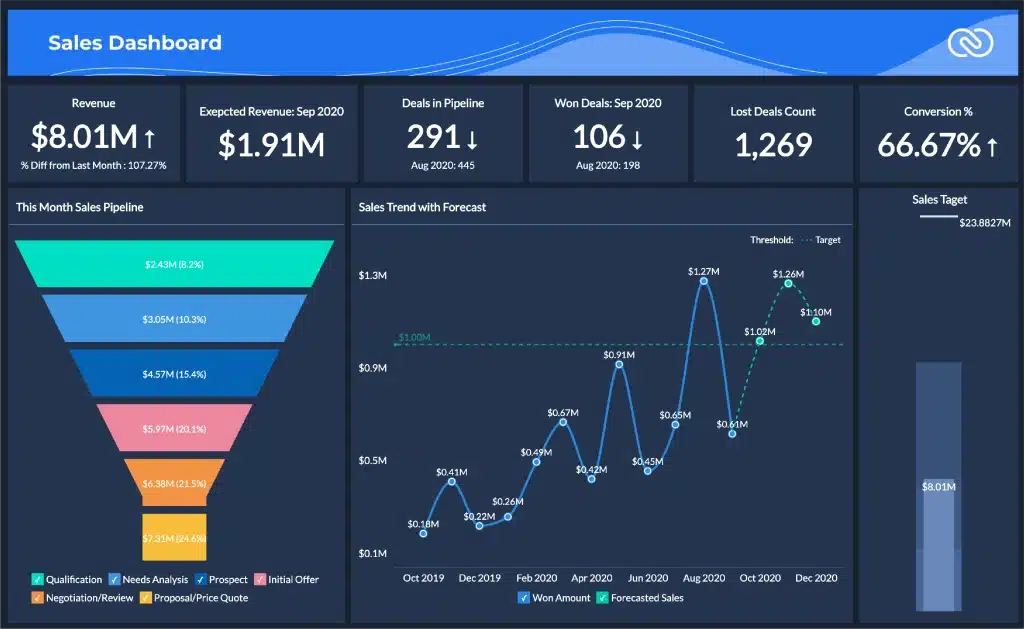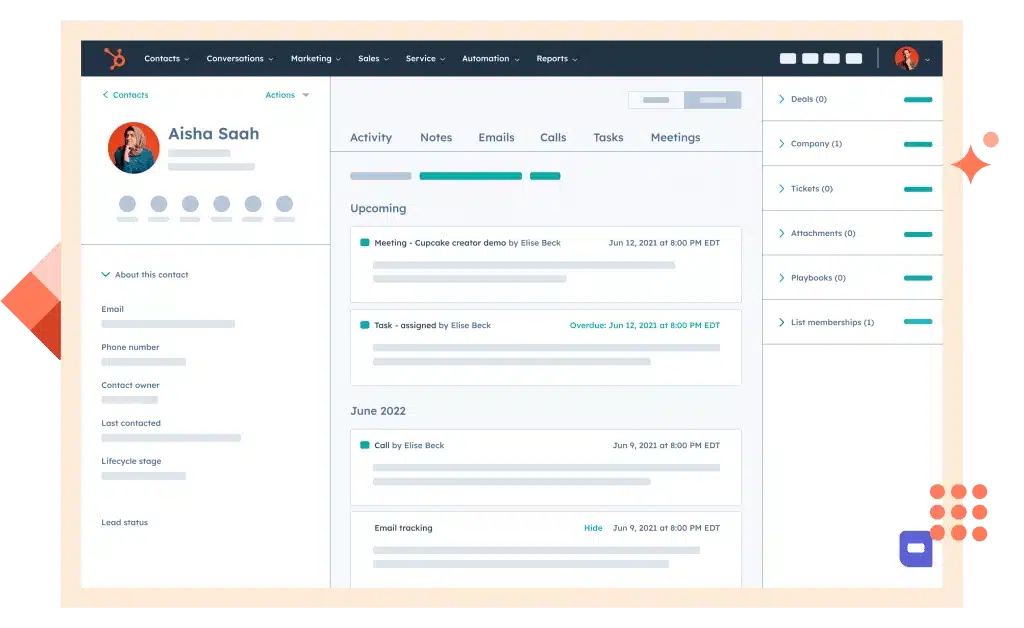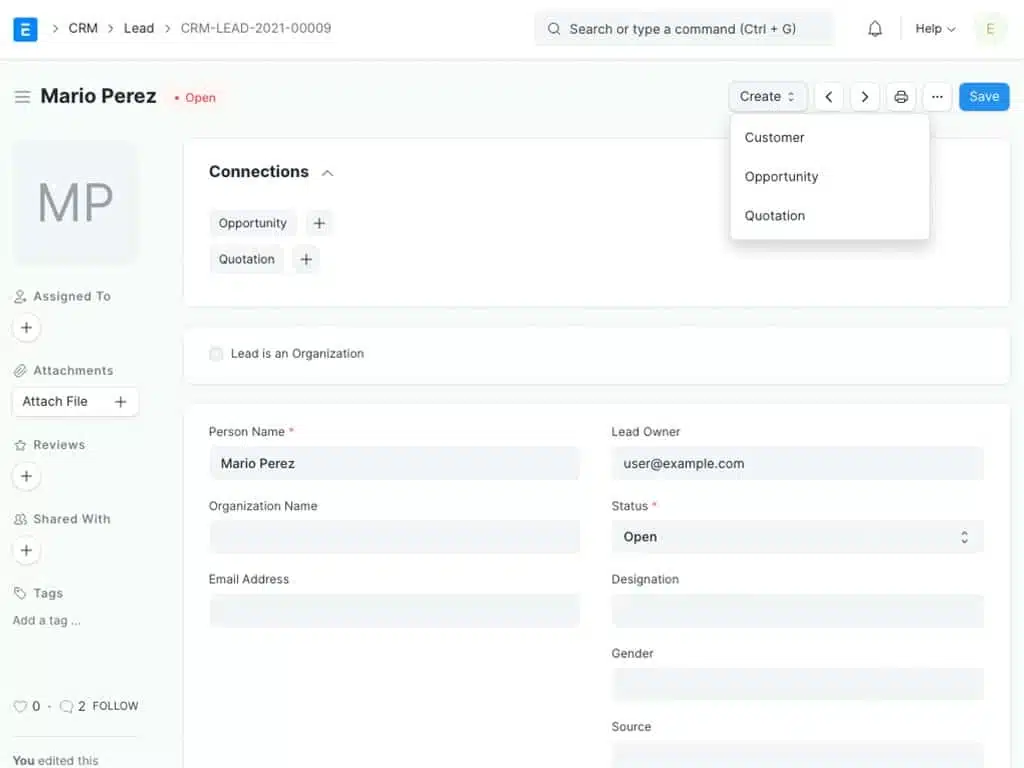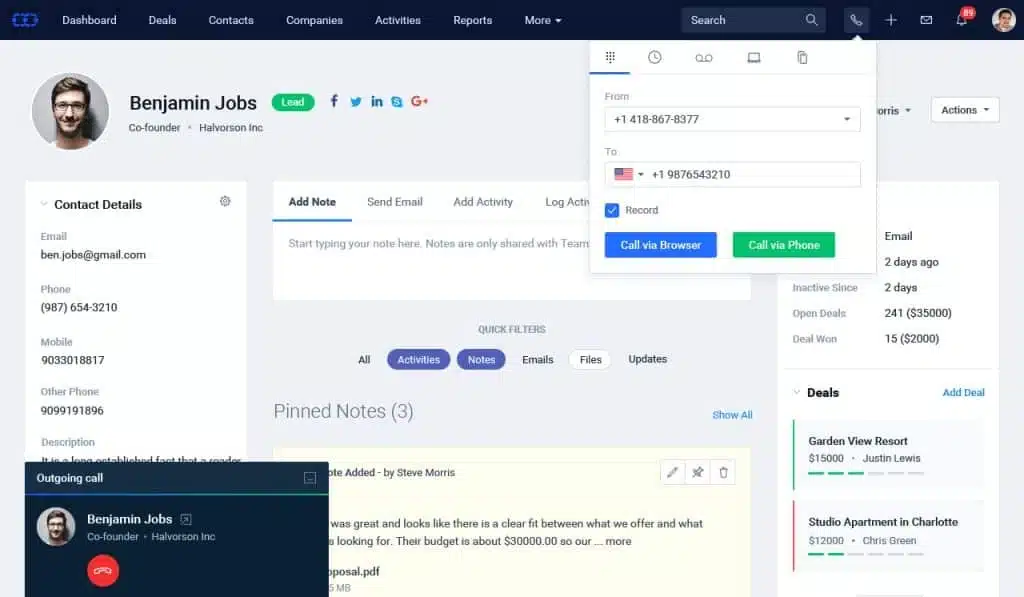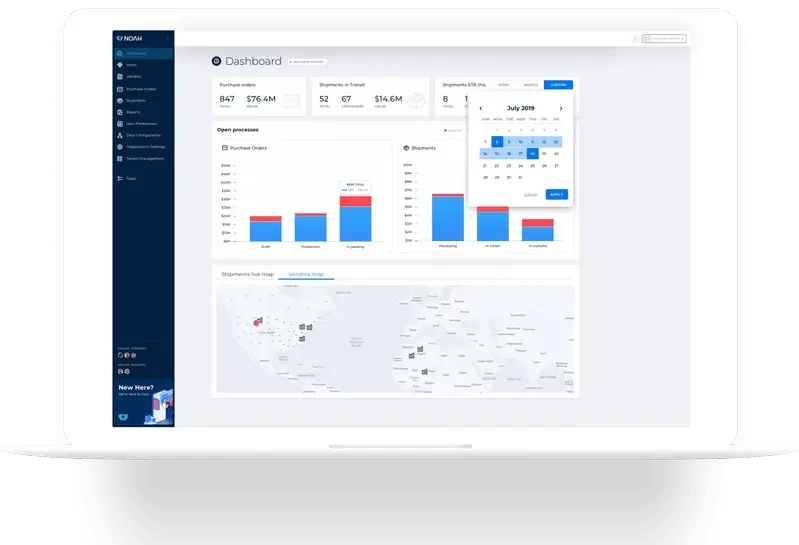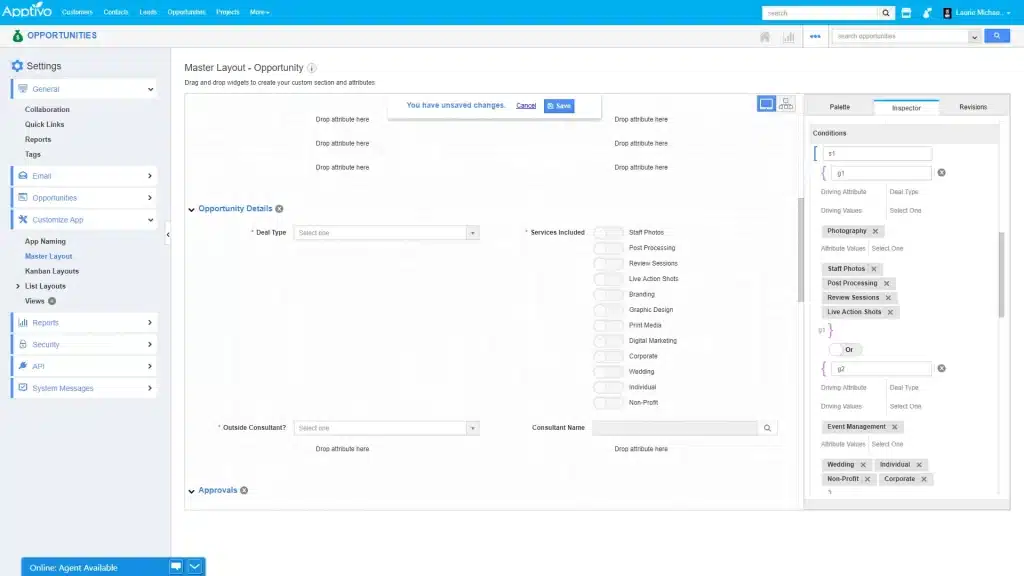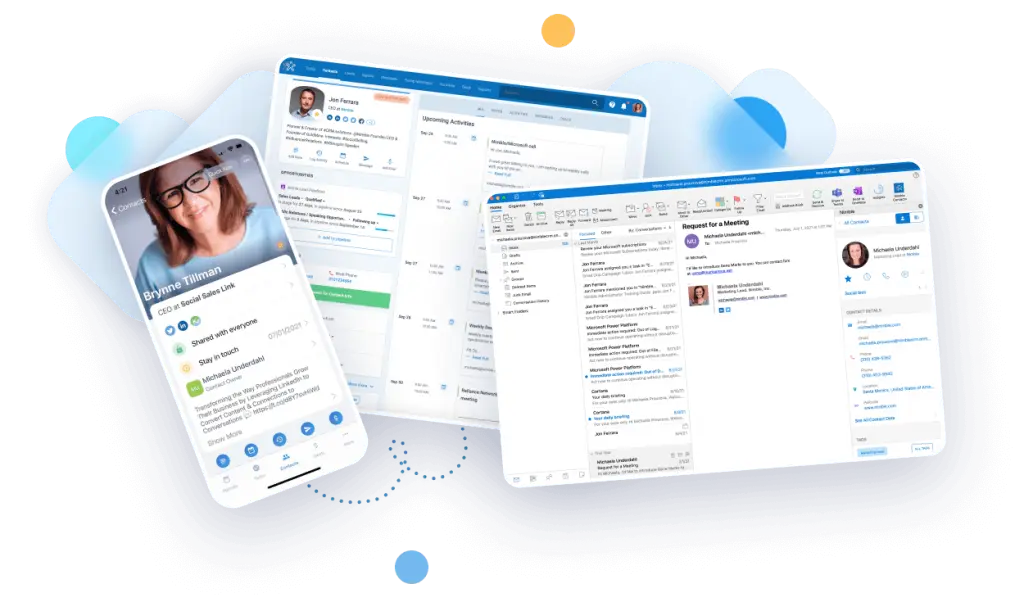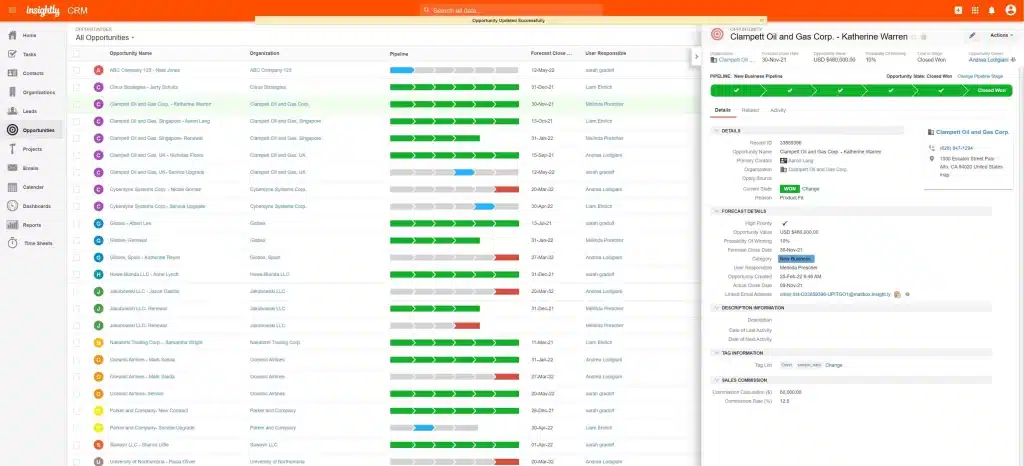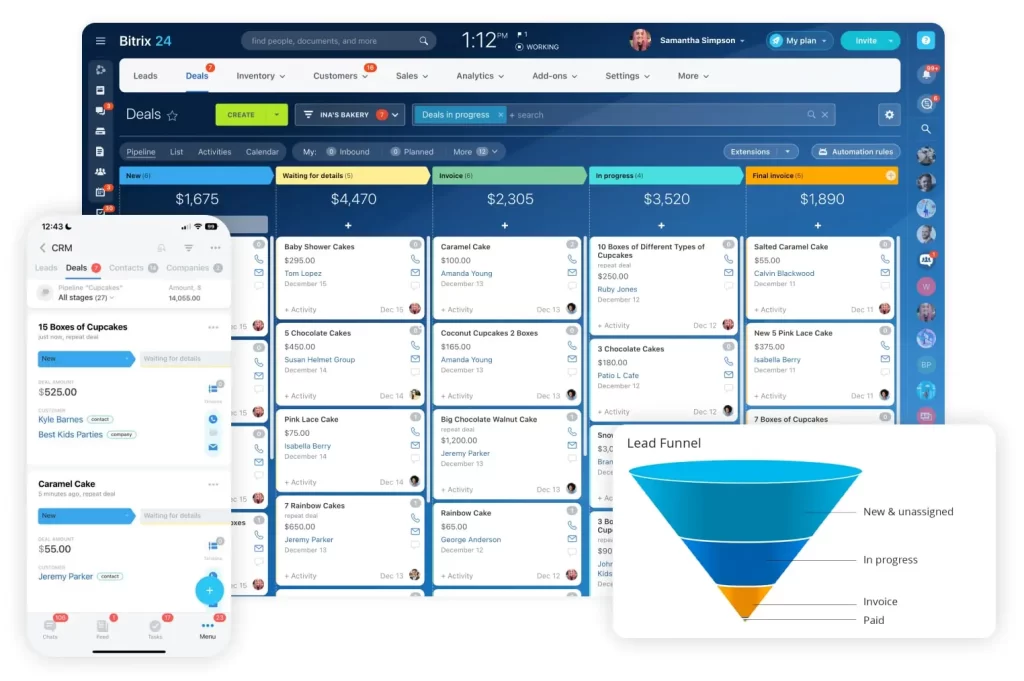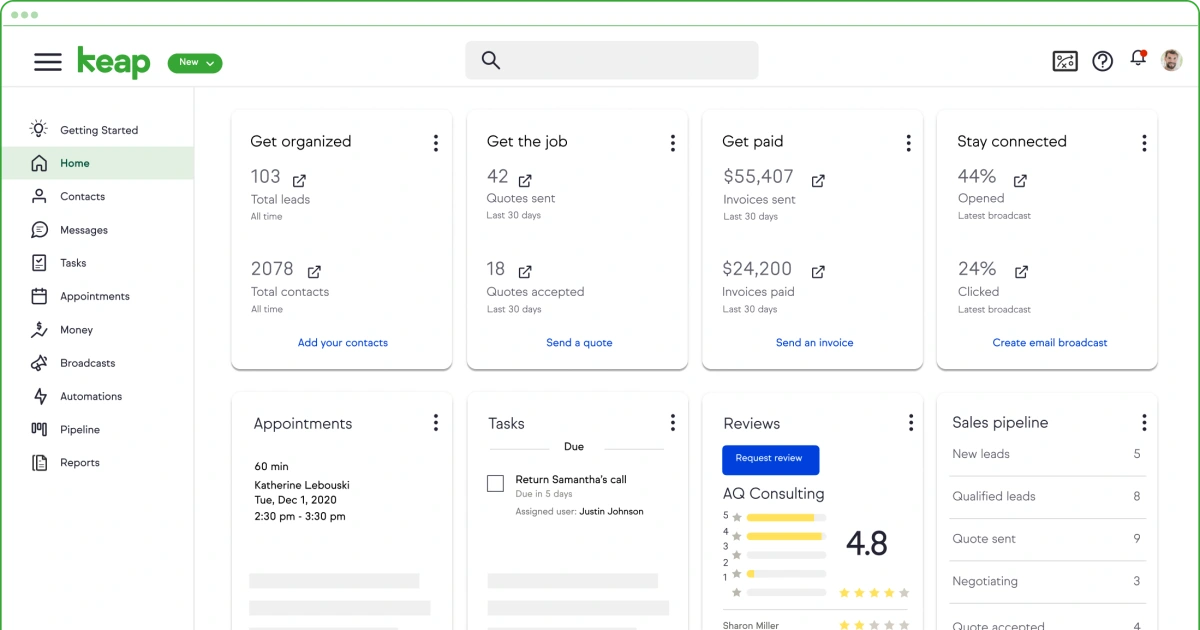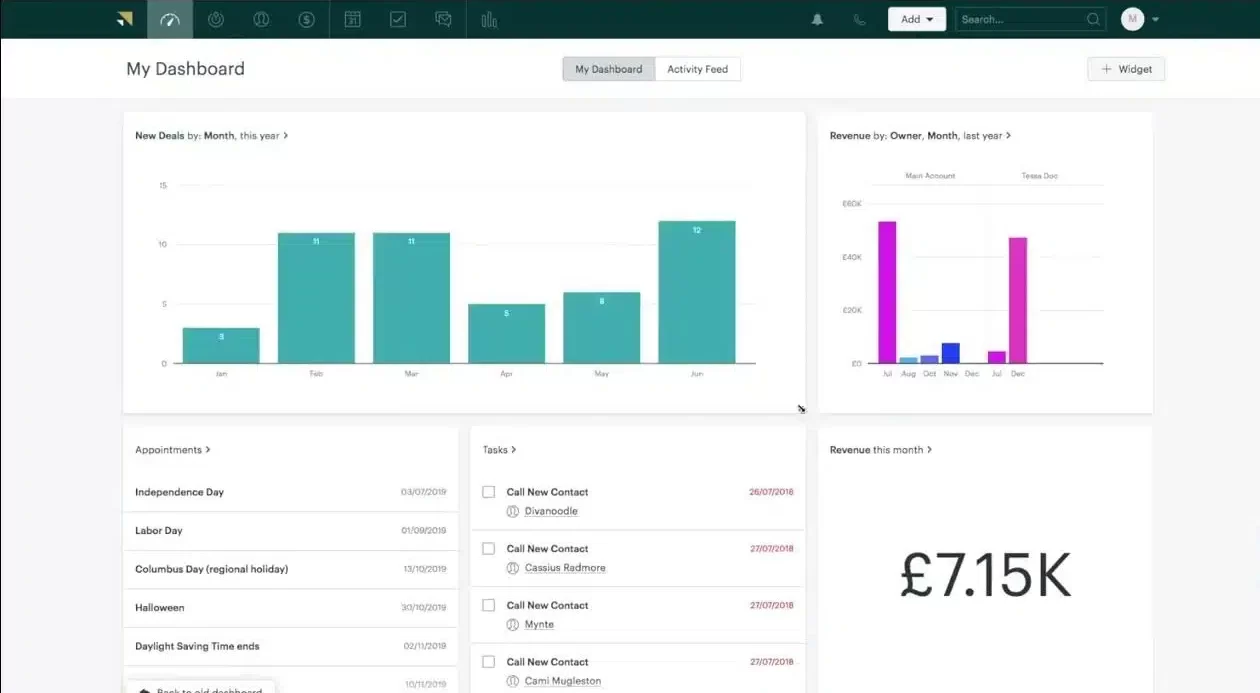Struggling to manage customer interactions and sales without the right CRM software? Lost leads, missed follow-ups, and inefficient processes can slow business growth.
According to a report from Statista, CRM Philippines is expected to reach USD 134.7 million by 2025, with a CAGR of 13.19% from 2025 to 2029, reflecting the rising demand for smarter customer management solutions. However, not all CRMs offer the automation and efficiency businesses need to stay competitive.
HashMicro’s CRM continuously improves to meet evolving business demands. With AI-driven analytics, automated follow-ups, and real-time sales tracking, it minimizes errors, speeds up deal closures, and maximizes revenue. Upang makita kung paano ito makakatulong sa iyong negosyo, maaari mong subukan ang free demo ngayon.
Mas epektibong pamamahala ng mga customer at mas matatag na relasyon gamit ang HashMicro. Tuklasin kung paano nito mapapabuti ang iyong negosyo.
Table of Contents

Key Takeaways
|
Which CRM Software Is Best for Your Business?
Best Because
The best end-to-end solution for all types of business needs
Best Because
Best for data-driven businesses seeking robust analytics.
Best Because
Best for marketing team needing intuitive lead management tools.
Best Because
Best for sales teams focused on lead nurturing.
Best Because
Best for SMEs looking for a user-friendly and scalable CRM.
Best Because
Best for businesses requiring highly customizable CRM.
Best Because
Best for small to medium-sized businesses that want an affordable CRM
Best Because
Best for sales teams looking for a user-friendly CRM
Best Because
Best for large enterprises needing an advanced CRM
What is CRM Software?
CRM software, or Customer Relationship Management software, is a tool that helps businesses manage and improve their interactions with customers by organizing contact details and analyzing customer data. It streamlines sales and marketing and enhances customer satisfaction and retention.
In the Philippine business landscape, CRM software helps prioritize and manage interactions with various stakeholders (customers, colleagues, and suppliers) throughout their engagement journey. CRM tools enable efficient interaction management across the board, from acquiring new clients to nurturing existing relationships and providing ongoing support.
Effective CRM software in the Philippines identifies prospects, manages customer relationships, and supports strategic initiatives, converting leads into loyal clients. It also assists in monitoring sales forecasts and evaluating key performance indicators (KPIs).
Key Functions of CRM Software
Before exploring the detailed features, it’s useful to understand the core functions that CRM software typically delivers. These functions help businesses manage customers more efficiently and support smoother sales activities.
- Improves accessibility: Gives teams on-the-go access to customer and sales information through web or mobile platforms, ensuring everyone can work efficiently from any location.
- Centralizes customer information: Stores essential customer details, interaction history, and preferences in one organized place, helping teams maintain consistent and well-informed communication.
- Streamlines routine tasks: Handles repetitive activities such as assigning leads, sending reminders, and organizing follow-ups so teams can focus on closing deals.
- Enhances sales and marketing coordination: Offers tools to manage pipelines, evaluate lead quality, run campaigns, and prepare sales documents, supporting better workflow alignment.
Provides actionable insights: Generates dashboards and reports that reveal customer trends, sales performance, and opportunities for improvement, helping leaders make quick, data-driven decisions.
Benefits of Using CRM Software in the Philippines
Implementing CRM software to your business in the Philippines offers many advantages. It tracks and manages all communications between your team and customers while identifying opportunities that need further attention or follow-up.
The other benefits of using the best CRM software Philippines include, but are not limited to:
1. Centralized customer information: CRM consolidates customer information into a single database, readily available to relevant personnel within your company. For instance, the sales team can access customer preferences and interaction history across multiple companies, aiding in product interest assessment.
2. Better sales performance: Implementing CRM software boosts sales by organizing customer data, automating tasks, and offering insights for personalized interactions. This leads to stronger relationships, higher conversions, and improved sales performance.
3. Higher productivity and efficiency: CRM software employs marketing automation technology to streamline tasks like drip campaigns. This frees up employees’ time for tasks that demand human attention, such as content creation. Furthermore, it ensures no tasks are overlooked. It guarantees that important emails reach the right recipients.
4. Improved customer retention: Using CRM software improves customer retention by allowing businesses to track and analyze customer interactions, preferences, and feedback effectively. This enables personalized communication and timely support, fostering stronger relationships and enhancing customer loyalty.
5. Accurate sales forecast: By leveraging the automated sales reports within CRM software, you can identify key trends and gain insights into future sales cycle performance. This allows you to adjust your goals and metrics to align with these projections.
6. Loyalty program integration: Many CRM systems come equipped with loyalty program software that allows businesses to reward repeat customers and boost retention. This feature enhances engagement by tracking points, incentives, and referral rewards efficiently.
Need to know!
AI in CRM enhances workflow efficiency and ensures more accurate decision-making. With Hashy AI from HashMicro, your customer management processes become smoother and error-free.

Get a Free Demo Now!
19 Best CRM Software Examples
Choosing the right CRM for your business can be tough, but we’ve got you covered! In this guide, we’re sharing the 19 Best CRM Software Platforms in the Philippines for 2026, handpicked for their features and ease of use.
1. HashMicro
HashMicro CRM software is a cloud erp solution tailored to businesses of all sizes and types, such as retail, consulting, real estate, and other industries. It provides significant assistance by streamlining tasks and ensuring all customer information is accurate and up-to-date. Hashmicro is a great CRM software example for businesses looking for a comprehensive solution.
To fully understand how HashMicro CRM can elevate your business operations and customer relationship management, you can try the free demo. Discover how the HashMicro CRM software can streamline your business processes and enhance customer engagement strategies.
Through its extensive features and supportive customer services, HashMicro has aided well-known companies in Singapore and Indonesia in customer management. Similarly, HashMicro provides exceptional service to businesses across various industries in the Philippines.
HashMicro best features:
- Lead age analysis: Tracks lead duration in each sales stage to spot delays, optimize processes, and speed up conversions.
- Lead scoring: Scores leads by purchase likelihood, helping sales teams prioritize high-potential opportunities.
- Sales pipeline management: Optimizes sales processes by organizing and tracking leads through each stage. This ensures efficient management and faster closing of deals.
- Revenue forecasting: Uses historical data and trends to accurately predict future revenues. This helps businesses plan their budget and allocate resources effectively.
- Multi-pricelist management: Manages multiple pricelists to ensure consistent pricing across branches and prevent customer confusion.
- Upselling products: Boosts sales by recommending products based on purchase history, encouraging customers to buy more.
- Sales team management: Tracks sales performance to boost productivity with actionable insights and strategies.
- GPS tracking: Tracks sales team locations to optimize coverage, improve route planning, and maximize productivity.
| Pros | Cons |
|
|
2. Zoho
Zoho CRM software, developed by Zoho, is a cloud-based CRM platform designed to oversee sales, marketing, and customer support in business-to-business (B2B) and business-to-customer (B2C) engagement strategies.
This software is delivered as a service (SaaS), accessible through popular web browsers compatible with any operating system. Additionally, Zoho CRM Platforms offers mobile applications for mobile devices. It equips users with fundamental CRM functionalities like email marketing, social CRM, marketing automation, and sales functions.
Zoho best features:
- Lead management
- Mobile access
- Deal management
- Contact management
- Workflow automation
- Omnichannel sales
- Reporting and analytics
| Pros | Cons |
|
|
Zoho CRM Software: Best for small to medium-sized businesses looking for a flexible, customizable CRM that integrates sales, marketing, and customer support in one platform.
Zoho Pricing: Zoho CRM offers pricing plans ranging from a Free Edition for up to three users to premium options, starting at $14 per user per month. Higher-tier plans provide advanced features like automation, AI tools, and increased storage, with a 15-day free trial available.
“Zoho CRM offers strong analytics and automation for data-driven teams. While its flexibility is a major strength, businesses should factor in the additional costs tied to advanced features.”
— Angela Tan, Regional Manager
3. HubSpot
HubSpot is a CRM software provider in the Philippines, offering tailored solutions for businesses in diverse sectors. It partners with GetCre8ive to provide customer relation management solutions to Philippines businesses. Its platform is designed to streamline customer relationship management processes effectively.
HubSpot ensures smooth integration and optimal performance for clients. With a dedicated team, they aim to enhance customer satisfaction and support business growth through innovative CRM solutions.
HubSpot best features:
- CRM Implementation
- CRM Migration
- Customer Marketing
- Email Marketing
- Knowledge Base Development
- Sales and Marketing Alignment
| Pros | Cons |
|
|
HubSpot CRM Software: Best for growing businesses that need an easy-to-use, free CRM with powerful marketing, sales, and customer relationship tools.
HubSpot Pricing: HubSpot offers a range of pricing plans tailored to different business needs, including free tools and premium options. Paid plans start at $20 per month for basic features, while advanced plans for marketing, sales, and customer service can cost up to $5,000+ per month, depending on the selected package and features.
“HubSpot excels in usability and marketing-centric tools, making it a great fit for growing teams. However, companies should consider its scalability limits before long-term adoption.”
— Angela Tan, Regional Manager
4. Hooman Design
Hooman Design Corporation is a digital experience provider in the Philippines. It is an agency aiming to provide accessible and affordable solutions for digital transformation, such as Web Design and Development, Learning Management Systems (LMS), and Enterprise Resource Planning (ERP). In addition to those solutions, it also provides CRM Platforms for businesses that need it.
Hooman Design best features:
- API integration
- Customer 360 view
- Knowledge management
- Workflow automation
- Sales management
| Pros | Cons |
|
|
Hooman Design CRM Solution: Suitable for businesses that want a user-friendly CRM with design-focused workflows to better engage and manage customer interactions.
Hooman Design Pricing: Hooman Design offers a cost-effective CRM solution with unlimited user accounts, starting at ₱3,000 per month.
“Hooman Design focuses on simplicity and visually intuitive workflows, which suit creative teams and SMEs. Its lighter feature set, however, may not meet the needs of larger or more complex organizations.”
— Angela Tan, Regional Manager
5. Salesmate
Salesmate is cloud-based CRM software. It aids sales teams in managing customers, deals, and tasks within a unified platform. Additionally, it encompasses functionalities such as contact management, deal tracking, task management, and integrated phone and email services. Salesmate is another crm tools list focused on sales team productivity.
Salesmate CRM software aims to enhance the productivity and efficiency of sales teams by providing tools to monitor customer interactions, track deals, and manage tasks effectively. Furthermore, its built-in phone and email system enables seamless customer communication directly from the CRM platform.
Salesmate best features:
- Appointment management
- Auto-dialer and auto-responders
- Campaign management
- Client management
- Email management
- Mobile access
- Lead management
- Reporting and analytics
| Pros | Cons |
|
|
Salesmate CRM Tools: Best for small to medium-sized businesses needing an efficient CRM solution that helps manage leads, sales, and customer relationships with ease.
Salesmate Pricing: Salesmate CRM Philippines pricing starts at $15 per user/month (billed annually) for basic features, while the Growth plan costs $30 per user/month with advanced tools for business expansion.
“Salesmate shines in lead nurturing and communication tools built for sales-focused teams. Its add-on costs and overseas support are trade-offs to consider for Philippine businesses.”
— Angela Tan, Regional Manager
6. NOAH Business
Founded in 2006, NOAH Business Applications is a Philippine CRM company that aims to provide business applications, including Customer Relationship Management (CRM).
NOAH Business Application offers a suite of CRM software solutions designed to assist businesses in managing customer relationships effectively. With customizable features and user-friendly interfaces, NOAH aims to streamline sales, marketing, and customer service processes. The features help companies to make informed decisions and optimize their sales.
Noah best features:
- Planning and budgeting
- Lead management
- Sales management
- Workflow automation
- Social media integration
- Notifications and alerts for schedule
| Pros | Cons |
|
|
NOAH Business CRM: Suitable for businesses seeking a CRM that integrates sales automation with a strong emphasis on improving customer relationships.
NOAH Business Pricing: NOAH CRM offers various pricing options based on business needs.
“NOAH CRM offers user-friendly functions and localized support, making it appealing for SMEs. Its core features are solid, but the limited scalability may restrict long-term growth.”
— Angela Tan, Regional Manager
7. Apptivo
Founded in 2009, Apptivo is a cloud-based CRM software for customer service. It was launched to provide affordable and easy-to-use solutions for businesses of all sizes.
Apptivo’s cloud-based CRM Platforms enables companies to attract, engage, and retain customers. It offers tools such as lead management, opportunity pipeline with intuitive dashboards, campaign management, and flexible workflow tools, including marketing automation.
Apptivo best features:
- Email marketing
- Lead management
- Multi-channel communication
- Pipeline management
- Reporting and analytics
- Sales report
- Mobile access
- Workflow management
| Pros | Cons |
|
|
Apptivo CRM Software: Best for small businesses and startups looking for a customizable CRM with a range of modules and easy integrations to suit various business needs.
Apptivo Pricing: Apptivo CRM offers flexible pricing plans to suit different business needs. Plans start at $15 per user per month, with advanced options going up to $40 per user per month for more features and customization.
“Apptivo provides excellent customization and workflow automation at an accessible price. Its limited integrations, however, may challenge teams with more advanced ecosystem needs.”
— Angela Tan, Regional Manager
8. Agile
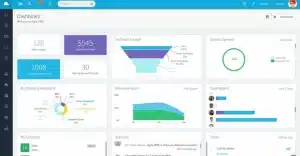
This approach aims to enhance customer engagement, optimize the customer lifetime cycle, and improve profitability. With Agile, users access a wide range of features, categorized into three main functions: Sales, Marketing, and Customer Service.
Agile best features:
- Account management
- Behavior tracking
- Call center management
- Campaign management
- Lead management
- Mobile access
- Project planning/scheduling
| Pros | Cons |
|
|
Agile CRM Solution: Suitable for businesses of all sizes that want a flexible, cost-effective CRM with robust sales automation and marketing tools to drive growth.
Agile Pricing: Agile CRM offers a free plan for up to 10 users, including 1,000 contacts and companies. Paid plans start at $8.99 per user per month for the Starter plan, with advanced features available in higher-tier plans.
“Agile CRM brings together sales, service, and marketing tools in a flexible package. It’s cost-effective, but some limitations in support and integrations may affect fast-growing companies.”
— Angela Tan, Regional Manager
9. Nimble
Nimble is a CRM Philippines company headquartered in Santa Monica, California, established by Jon Ferrara, who also founded the CRM company Goldmine. In 2010, Nimble introduced its private beta version globally. Initially, it is a CRM solution integrating social media and collaboration features. However, now Nimble excels in integrating with Office 360 and Google Workspace.
Nimble best features:
- Email campaign management
- Lead management
- Marketing automation
- Pipeline management
- Mobile access
- Reporting and analytics
- Sales activity management
| Pros | Cons |
|
|
Nimble CRM Software: Best for small businesses and entrepreneurs seeking a simple, social CRM that efficiently manages contacts and integrates social media interactions.
Nimble Pricing: Nimble CRM offers a single Business Plan at $29.90 per user per month or $24.90 per user per month when billed annually.
“Nimble is ideal for small teams that rely heavily on email and social engagement. Its simplicity is a strength, though larger sales operations may outgrow its capabilities.”
— Angela Tan, Regional Manager
10. Insightly
Insightly is a cloud-based CRM and pipeline management tool facilitating seamless collaboration and remote work for teams. Users can streamline various pipelines, tasks, and workflows with different plan options available, catering to sales and marketing teams or general project management needs.
Insightly provides visually appealing charts on customizable dashboards, which enhance accessibility to necessary data and ensure quick comprehension.
Insightly best features:
- Workflow automation
- Sales lead tracking
- Sales pipeline and lead management
- Project and task management
- Product, price books, and quotes
- Mobile access
| Pros | Cons |
|
|
Insightly CRM Tools: Suitable for businesses looking for a powerful, user-friendly CRM that combines project management, sales, and customer relationship management in one platform.
Insightly Pricing: The Plus plan is priced at $29 per user per month, while the Professional plan costs $49 per user per month. For advanced features, the Enterprise plan is available at $99 per user per month.
“Insightly offers strong project and pipeline management, making it valuable for companies balancing sales and operations. Teams needing advanced lead-scoring may find the platform limiting.”
— Angela Tan, Regional Manager
11. EngageBay
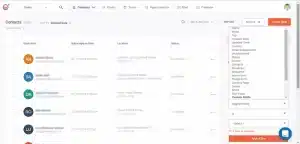
With its built-in CRM, companies can easily manage and track all activities across customers, leads, and deals as they move through pipelines. Moreover, EngageBay provides marketing features like automated email templates, customizable forms/popups, and social media engagement to generate leads.
EngageBay best features:
- Contact management
- Task management
- Sales reporting
- Mobile access
- Email Broadcast
- Social media marketing
- Reporting and analytics
| Pros | Cons |
|
|
EngageBay CRM Software: Best for small to medium-sized businesses that want an affordable, all-in-one CRM for marketing, sales, and customer support to boost productivity.
EngageBay Pricing: The Basic Plan starts at $14.99 per user per month, while the Growth Plan is priced at $49.99 per user per month. For more advanced features, the Pro Plan is available at $99.99 per user per month
“EngageBay delivers a well-rounded marketing and CRM suite at an affordable price. Its outdated templates and reporting gaps are areas to consider for data-driven teams.”
— Angela Tan, Regional Manager
12. Bitrix24
Bitrix24 functions as a collaborative CRM tool, offering users a range of features, including CRM, document management, task, and project management. These are all within a social-style environment, including user profiles, liking, commenting, instant messaging, and content sharing.
Bitrix24 seeks to offer a practical solution for managing a company online, providing flexible and precise tools for tasks. The tasks mentioned include clocking in at the start of the day, processing sales, and generating reports.
Bitrix24 best features:
-
-
- Marketing automation
- Leads management
- Quotes and invoices
- Custom forms
- Task management
- Mobile access
- Project management
-
| Pros | Cons |
|
|
Bitrix24 CRM Software: Suitable for teams seeking a collaborative, free CRM that integrates communication tools, project management, and automation in a single platform.
Bitrix24 Pricing: Paid plans start at $61 per month for the Basic plan, with advanced options like the Professional plan at $249 per month, catering to varying business needs.
“Bitrix24 stands out for collaboration tools and its wide feature set, especially for startups. However, its complex interface may require extra onboarding for new users.”
— Angela Tan, Regional Manager
13. Salesforce

Its platform includes robust Sales, Cloud, and Marketing systems, enhanced with comprehensive Analytics and Marketing services.
Additionally, Salesforce CRM is not only straightforward to implement and operate, but its user-friendly metrics, as highlighted by Salesforce Customer Success, demonstrate its remarkable effectiveness.
Salesforce best features:
- Contact and Account Management
- Opportunity Management
- Report and Dashboard
- Lead Management
| Pros | Cons |
|
|
Salesforce: Best for large businesses and enterprises needing a highly customizable, cloud-based CRM with advanced features and powerful integrations.
Salesforce Pricing: Salesforce CRM offers various pricing plans to suit different business needs, starting at $25 per user per month for the Essentials plan. Advanced options like the Unlimited plan cost up to $300 per user per month, providing full features and premium support.
“Salesforce remains one of the most powerful CRM systems globally, with unmatched customization and enterprise-grade tools. It’s best suited for companies ready to invest in a robust ecosystem.”
— Angela Tan, Regional Manager
14. Creatio
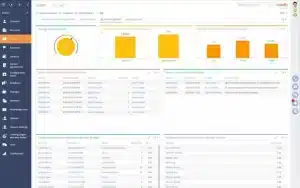
Creatio best features:
- Sales creatio
- Marketing creatio
- Service creatio
| Pros | Cons |
|
|
Creatio CRM: Suitable for businesses that need a no-code CRM solution with powerful business process management and automation tools to drive efficiency.
Creatio Pricing: Creatio CRM offers three pricing plans to accommodate various business needs. The Growth plan starts at $25 per user per month, the Enterprise plan at $55 per user per month, and the Unlimited plan at $85 per user per month.
“Creatio offers strong automation and no-code capabilities, ideal for teams wanting flexible workflows. Its higher pricing and technical setup may pose challenges for smaller teams.”
— Angela Tan, Regional Manager
15. Monday Sales
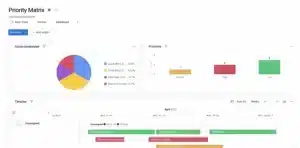
Monday sales best features:
-
- Sequences
- Email composition
- Activity tracking
- Mass emails
| Pros | Cons |
|
|
Monday Sales CRM: Best for teams that need a simple, customizable CRM that integrates with various work tools and enhances sales workflow management.
Monday Sales Pricing: Monday Sales CRM pricing starts at $10 per user/month (billed annually) with a minimum of three users. Higher-tier plans offer advanced features at increased rates.
“Monday Sales CRM is an intuitive and customizable tool for teams that value visual pipelines. Its automation limits on lower tiers may require upgrades as companies scale.”
— Angela Tan, Regional Manager
16. Pipedrive
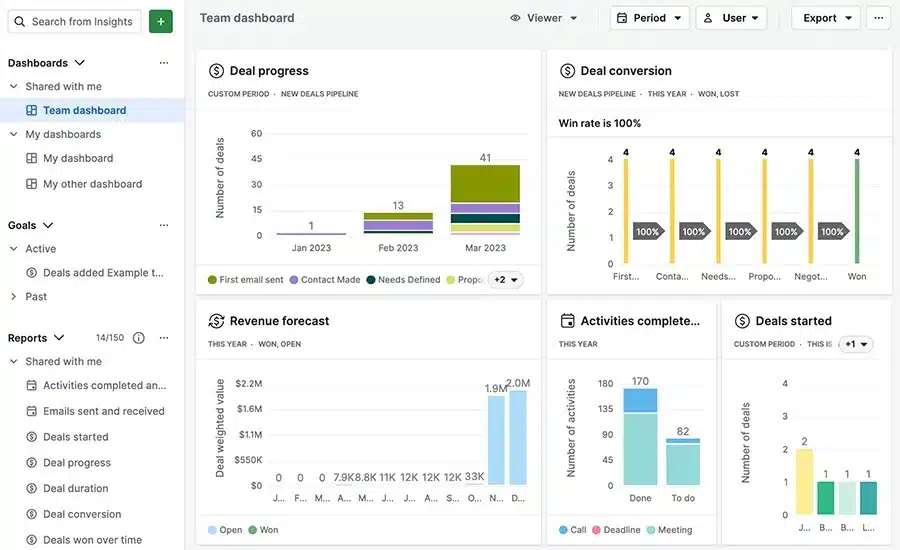
Pipedrive best features:
- Customization
- Ease of Use
- Chatbots
- Customization
| Pros | Cons |
|
|
Pipedrive: Best for sales teams looking for a user-friendly CRM with robust pipeline management and automation features to close deals faster.
Pipedrive Pricing: Pipedrive CRM offers pricing plans starting at $14 per user/month for the Essential plan, up to $129 per user/month for the Enterprise plan. Each plan includes different features to suit various business needs.
“Pipedrive excels in pipeline visibility and ease of use, making it great for sales-driven organizations. Its limited reporting and customization may require additional tools for advanced teams.”
— Angela Tan, Regional Manager
17. Oracle NetSuite
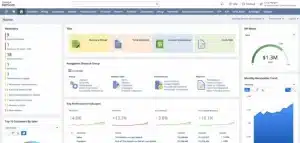
Oracle NetSuite best features:
- Automated project planning to execution
- Invoice generation
- Making payments
- Report generation
- Expense tracking
| Pros | Cons |
|
|
Oracle NetSuite: Suitable for large enterprises needing an advanced CRM system integrated with ERP and financial management for seamless operations across all departments.
Oracle NetSuite Pricing: Oracle NetSuite pricing varies based on business needs, with user licenses typically ranging from $100 to $300 per user per month. Implementation costs can start at $25,000 and go much higher depending on customization and modules required.
“NetSuite CRM offers enterprise-level depth and strong integration with ERP systems. It’s powerful but can be complex for SMBs without dedicated IT support.”
— Angela Tan, Regional Manager
18. Keap
Keap CRM is a sales and marketing automation platform designed for small to medium-sized businesses that need an organized system for managing contacts, communications, and sales activities. It helps teams automate repetitive tasks and streamline client follow-ups for faster conversions.
Keap best features:
- Automated follow-up reminders and workflows
- Built-in email and SMS marketing
- Lead and sales pipeline management
| Pros | Cons |
|
|
Keap CRM Software:
Best for small businesses seeking an automation-heavy CRM to simplify follow-ups, improve lead nurturing, and boost overall sales productivity.
Keap Pricing:
Plans start at $159 per month, with higher tiers offering expanded automation, advanced analytics, and multi-user features.
“Keap is a strong choice for automation-heavy small businesses needing streamlined follow-ups. Its higher-tier pricing and limited customization on lower plans should be considered.”
— Angela Tan, Regional Manager
19. Zendesk Sell
Zendesk Sell is a modern CRM built to help sales teams improve productivity with clear pipelines, real-time visibility, and automated workflows. It is part of the Zendesk suite, making it ideal for businesses that want seamless customer service and CRM integration.
Zendesk best features:
- Sales pipeline and forecasting tools
- Automated task reminders and follow-ups
- Mobile app with real-time performance dashboards
| Pros | Cons |
|
|
Zendesk CRM Software:
Best for businesses already using Zendesk or those wanting a CRM tightly integrated with customer support operations.
Zendesk Pricing:
Plans start at $19 per user per month, with higher tiers offering advanced lead scoring, task automation, and team performance insights.
“Zendesk Sell provides clean pipelines and smooth integration with Zendesk Support, ideal for service-focused teams. Its limited marketing tools may require pairing with additional platforms.”
— Angela Tan, Regional Manager
Full Comparisson of Best CRM System
| Brand | Best for | Pros | Cons | Price |
|---|---|---|---|---|
| 1) HashMicro | Best for businesses needing an all-in-one CRM integrated with ERP modules | 1) Fixed pricing with no hidden costs 2) Unlimited users 3) Seamless ERP and module integration 4) Highly customizable 5) Scalable for business growth | 1) Complex features for small businesses 2) Implementation time varies | Custom Pricing |
| 2) Zoho | Best for SMEs needing flexible CRM with sales and marketing automation | 1) Free plan available 2) Automation included on all plans 3) Wide integration ecosystem | 1) Extra cost for advanced features 2) Limited custom fields | starts from $14/Month |
| 3) HubSpot | Best for growing teams wanting an easy-to-use, marketing-focused CRM | 1) Easy to use interface 2) Strong marketing and sales tools 3) Free entry-level plan | 1) Limited CRM depth 2) Scalability constraints | starts from $20/Month |
| 4) Hooman Design | Best for SMEs wanting a simple, design-oriented CRM workflow | 1) Customizable dashboards 2) Streamlined pipelines 3) Simple client management | 1) Limited advanced features 2) Fewer global integrations | starts from ₱3,000/Month |
| 5) Salesmate | Best for sales teams focused on lead tracking and communication efficiency | 1) Built-in calling and email tools 2) Intuitive dashboard 3) Strong sales productivity features | 1) Add-on costs increase pricing 2) Limited marketing features | starts from $15/Month |
| 6) NOAH Business | Best for local businesses needing basic CRM with local support | 1) Easy to use 2) Local customer support 3) Customizable workflows | 1) Not scalable for large teams 2) Limited integrations | Contact Vendor |
| 7) Apptivo | Best for startups needing modular CRM with strong workflow automation | 1) Advanced workflow automation 2) Modular features 3) Intuitive UI | 1) Limited integrations 2) Restricted storage and reporting | starts from $15/Month |
| 8) Agile | Best for teams wanting affordable CRM with sales and marketing tools | 1) Free plan available 2) Sales, marketing, and service features 3) Cost-effective | 1) Limited integrations 2) Weak support on lower tiers 3) No real-time updates | starts from $8.99/Month |
| 9) Nimble | Best for small teams relying on email and social relationship management | 1) Strong email integration 2) Efficient task management 3) Useful reporting | 1) Limited mobile functionality 2) Confusing interface 3) Weak customer support | starts from $29.90/Month |
| 10) Insightly | Best for teams combining CRM with project and pipeline management | 1) Customizable dashboards 2) Strong third-party integrations 3) Project management features | 1) No lead scoring 2) Extra cost for calling features | starts from $29/Month |
| 11) EngageBay | Best for SMEs needing affordable all-in-one sales and marketing CRM | 1) Free plan available 2) Integrated marketing and sales tools 3) Affordable pricing | 1) Outdated templates 2) Shallow reporting depth 3) Steep learning curve | starts from $14.99/Month |
| 12) Bitrix24 | Best for teams needing collaboration-focused CRM with task management | 1) Collaboration and task management tools 2) Built-in project features 3) Free entry plan | 1) Complex interface 2) Difficult mobile usage 3) Paid plan user minimum | starts from $61/Month |
| 13) Salesforce | Best for enterprises needing highly customizable, scalable CRM | 1) Highly customizable platform 2) Enterprise-grade features 3) Powerful analytics | 1) High cost for small businesses 2) Internet dependency | starts from $25/Month |
| 14) Creatio | Best for businesses needing no-code CRM with strong process automation | 1) No-code customization 2) Strong automation tools 3) Flexible workflows | 1) High cost for full modules 2) Requires technical setup | starts from $25/Month |
| 15) Monday | Best for teams needing simple, visual sales pipeline management | 1) Visual pipelines 2) Easy-to-use automations 3) Strong team collaboration | 1) Automation limits on lower plans 2) Minimum seat requirement | starts from $10/Month |
| 16) Pipedrive | Best for sales-driven teams needing strong pipeline visibility | 1) Simple and intuitive pipeline management 2) Workflow automation 3) Easy adoption | 1) No free plan 2) Limited reporting on lower tiers | starts from $14/Month |
| 17) Oracle NetSuite | Best for enterprises needing CRM tightly integrated with ERP | 1) Deep ERP integration 2) Advanced financial and sales capabilities 3) Enterprise scalability | 1) Complex for SMBs 2) High implementation cost | starts from $100/Month |
| 18) Keap | Best for small businesses needing automation-heavy follow-up workflows | 1) Strong automation workflows 2) Built-in email and SMS tools 3) Sales-focused design | 1) High pricing on advanced tiers 2) Limited customization on entry plans | starts from $159/Month |
| 19) Zendesk | Best for teams needing CRM tightly integrated with customer support | 1) Clean pipeline interface 2) Strong Zendesk integration 3) Useful sales automation | 1) Add-ons raise total cost 2) Limited marketing capabilities | starts from $19/Month |
Recomendation of Best CRM System
- For businesses needing an all-in-one CRM deeply integrated with ERP, finance, inventory, and operations → HashMicro
- For SMEs looking for flexible CRM with sales and marketing automation → Zoho, EngageBay, Apptivo
- For growing teams prioritizing ease of use and marketing-led CRM adoption → HubSpot, Agile, Keap
- For sales-driven teams focused on pipeline visibility and deal tracking → Pipedrive, Salesmate, Insightly
- For startups and small teams needing affordable, modular CRM solutions → Hooman Design, NOAH Business, Bitrix24
- For enterprises requiring high customization, scalability, and advanced analytics → Salesforce, Oracle NetSuite, Creatio
- For teams emphasizing collaboration, visual workflows, and task-based CRM → Monday, Zendesk, Nimble
How To Choose the Best CRM Software
Choosing the right CRM software for your business requires a careful consideration. With many options available, picking the wrong one can waste time and money. To avoid this, here are key factors to consider before making your decision:
1. Time-to-value
Investing time and resources into adopting and learning a new, complicated system isn’t beneficial for your business. You need a CRM solution that delivers fast time-to-value. With such a product, you’ll experience reduced ownership expenses and be able to quickly get started. A good CRM system should have the following:
- User-friendly interface: With an intuitive platform, you can start using the CRM system immediately and easily navigate all the features. This results in less time spent on learning how the software works.
- Customization: An extensive range of pre-built integrations and robust APIs enable you to personalize the software according to your requirements. As a result, you don’t need to rely on costly external consultants. Therefore, this saves you both time and money.
- Easy administration: Minimal administration reduces the cost of expensive support and resources, allowing you to dedicate more time to customer-focused activities.
2. Robust reporting features
Choose CRM tools with comprehensive reporting and analytics to gain invaluable insights into your customers and business. This will aid you in improving your strategy, resulting in optimal customer relationship management.
- Accurate forecasting: This feature lets you predict your business’s revenue and growth.
- Pipeline analysis: With pipeline analysis, you can accurately see your prospects in the pipeline and spot any bottlenecks.
- Advanced analytics: It offers historical data, ready-made dashboards, and collaboration tools, enabling you to gather actionable insights.
3. Team productivity features
Good CRM software offers features to maximize team productivity. In addition to ensuring the team achieves its targets, it also helps streamline repetitive tasks. As a result, the team can focus more on improving customer relations instead of wasting time on repetitive tasks.
- Email integration: It improves efficiency with helpful tools like automatic tracking, alerts, and templates.
- Sales engagement tools: This feature helps build automated email sequences, complete with the recipient target lists.
- Smart contact lists: It aids the company in managing its contacts and ensuring that every contact is well taken care of.
4. Customer experience features
Your team can use specific features to enhance the customer experience, thereby strengthening customer relationships. Look for CRMs that provide features designed to streamline customer interactions and personalize engagements, ultimately fostering loyalty and long-term customer satisfaction.
- A centralized platform: This platform is useful for managing leads, contacts, and account information. All of the information can be accessed in one location.
- An app marketplace: A CRM tool must have this feature because it lets you connect with marketplace apps that you need to manage your business.
- A complete customer view: With a rounded, complete view of your customer data, you can provide better, personalized service to them.
5. Integration with other systems
Selecting a CRM with an open and adaptable platform is crucial as it considers your current investments and integrates seamlessly with your existing technology stack. By managing all your systems and customer data, you’ll achieve a comprehensive customer view and a more thorough understanding of your audience.
With highly customizable CRM software like HashMicro, your team members have access to all the necessary tools to perform their tasks efficiently in a single location. Additionally, it’s developer-friendly, simplifying the process of creating custom CRM applications or integrations quickly and effortlessly.
Must-Have Features in a CRM Software
Choosing the right CRM software is crucial for improving customer relationships and business efficiency. Before making a decision, explore different platforms and review their feature lists to ensure they meet your needs. Here are the essential features to look for:
- Pipeline Management: A reliable CRM software should offer visual pipelines (like Kanban boards) to track deals and sales progress at every stage.
- Task Management Tools: Stay on top of your workload with built-in calendars, to-do lists, and task boards to monitor important activities and deadlines.
- Workflow Automation: Boost efficiency by automating repetitive tasks, follow-ups, and workflows, saving time and reducing manual work.
- Seamless Integrations: Ensure your CRM software connects easily with your existing tools, such as email, accounting, or marketing platforms.
- Document Management System (DMS): A CRM software with a document management system lets you store and attach important files to clients, deals, and tasks.
- Industry-Specific Capabilities: For businesses in real estate, finance, marketing, or customer service, look for specialized features like email marketing, telephony, or portfolio tracking.
Selecting the best CRM software requires careful consideration. Make sure your chosen platform includes these key features for maximum efficiency and growth!
Conclusion
Managing your customers is a vital part of your business. But with the right CRM software, consolidating customer relationships and tracking sales are more effortless. Not only do you streamline tasks, but you also can significantly improve sales performance and revenue. Therefore, you should consider carefully when it comes to selecting suitable CRM tools for your business.
You might want to try HashMicro CRM Software. With complete and superior features, affordable prices, and strong integration capabilities, our software can help you optimize your customer management and sales. Additionally, our software provides insights into your business performance, enabling you to stay ahead of your competitors.
If you want to learn more about our CRM system, register for our free demo or contact our team.
FAQ About CRM Software
-
What are the 4 types of CRM systems?
The four basic types of CRM systems are:
1. Operational CRM: Focuses on automating and streamlining customer-facing processes like sales, marketing, and customer service.
2. Analytical CRM: Analyzes customer data to enhance decision-making and improve customer relationship strategies.
3. Collaborative CRM: Enables the sharing of customer information between various departments (sales, marketing, service) to improve communication and collaboration.
4. Campaign Management CRM: Specializes in managing marketing campaigns and customer interactions to improve targeting and results. -
How to use CRM for customer service?
To use CRM for customer service, businesses can track customer inquiries, complaints, and service history in real time. By centralizing customer data, support teams can provide more personalized, efficient service and resolve issues faster. CRM systems also help automate follow-ups, monitor service quality, and ensure consistent communication.
-
What are the three functions of CRM?
The three main functions of CRM are:
1. Sales Management: Manages and tracks sales opportunities, helping to close deals and manage customer relationships.
2. Marketing Automation: Automates marketing tasks such as sending emails, tracking customer responses, and segmenting contacts for targeted campaigns.
3. Customer Support: Facilitates managing customer interactions, from support tickets to case resolution, ensuring a seamless customer experience. -
How to protect your CRM data?
To protect CRM data, businesses should implement robust security measures such as encryption, two-factor authentication, and strong password policies. Regular data backups, role-based access controls, and secure networks are essential to preventing unauthorized access and data breaches.
-
How can an SMB benefit from a CRM?
An SMB can benefit from CRM by improving customer relationship management, enhancing sales processes, and providing better customer insights. CRM systems help small businesses track customer interactions, automate marketing tasks, improve customer service, and increase efficiency, ultimately leading to more streamlined operations and increased revenue.
-
What is the purpose of CRM?
The purpose of CRM is to build and maintain strong, lasting relationships with customers. It helps businesses manage customer information, track interactions, improve customer satisfaction, and drive sales by centralizing data, automating processes, and enabling personalized communication.


















